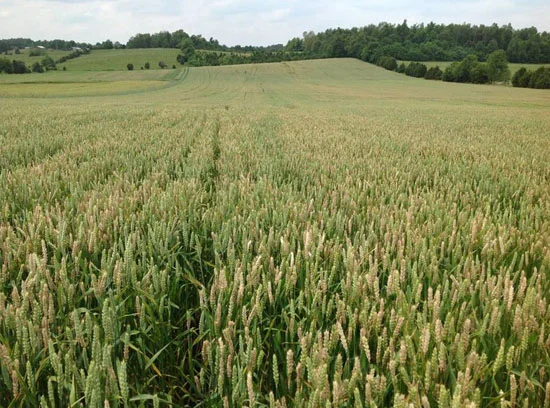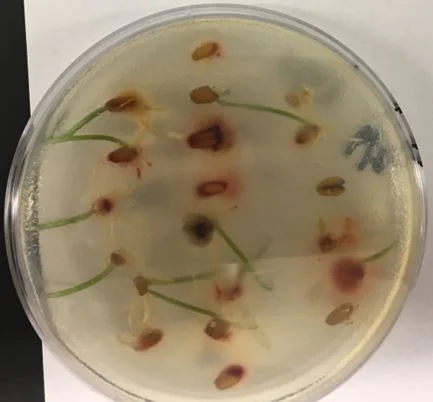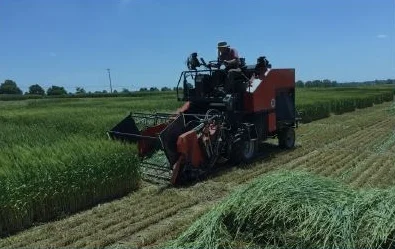Annual ryegrass has been chosen as the central focus of the greenhouse and field research due its notable advantages and the compelling proof of its effectiveness. Annual ryegrass roots apparently contain exudates that have a degrading effect on the fragipan. The deep root penetration also increases soil porosity and may facilitate the leaching of the 4 or 5 other effective compounds down to the fragipan. We are presently looking for varieties of annual ryegrass that are more effective in breaking down the fragipan and varieties that are more easily killed by glyphosate.
Read MoreThe overall objective of the research trials were to develop the best recommendations for managing Fusarium head blight (FHB; also known as scab) and the associated mycotoxin deoxynivalenol (DON; also known as vomitoxin) with foliar fungicides.
Read MoreRye as a grain crop has a potential local market with distilleries. Rye has not been grown in Kentucky since the 1920’s. We have been conducting research for several years on growing rye for grain. In the 2019 harvest season, we established rye at Princeton and Lexington to test several management hypotheses and fungicide efficacy against the Fusuriaum head blight (FHB).
Read MoreStagonospora leaf blotch is one of the most common foliar diseases observed in Kentucky. When flag leaves are affected by leaf blotch, yield losses generally occur. Glume blotch also is a common disease in Kentucky, and can reduce yields and test weight. One of the most common ways to manage these diseases is through application of foliar fungicides.
Read MoreThis work is intended to answer the question: Are there long term soil health benefits to having wheat in Kentucky farmers’ crop rotation? Comparing wheat harvested for yield to wheat (or other small grain) as a cover crop, is it better for the soil to take wheat to grain harvest?
Read MoreSpecialty small grains (e.g., cereal rye, hard red winter wheat, and malting barley) are a vital input into products like artisan bread, craft beer, and bourbon. Therefore, there are potential opportunities for Kentucky farmers to supply various specialty small grains to support the expansion in these markets.
Read MoreCurrent agronomic practices to reduce vomitoxin levels include planting moderately resistant wheat cultivars and fungicide applications at beginning flowering (Feekes 10.5.1 growth stage). This project is examining whether additional agronomic practices may potentially lower vomitoxin levels.
Read MoreCrossing: We produced a total of 550 crosses in the greenhouse this season. We made both single cross hybrids between 2 parental lines (138) and 3-way crosses (412) where the hybrid is crossed to a third parent.
Read MoreSiemer Milling Company is making a gift of $1 million to the University of Kentucky Grain and Forage Center of Excellence to support initiatives to improve grain quality and agronomic productivity of wheat in Kentucky and the region.
Read MoreThe Virginia Tech barley program is significantly diverse with breeding efforts focused on the development of superior, widely adapted, high yielding winter barley cultivars and a major focus on the incorporation of value-added traits geared towards the development of new markets.
Read MoreTraditionally in Kentucky, irrigation is unnecessary in winter wheat due to the high precipitation usually experienced in the state. However, with bouts of droughts becoming increasingly frequent in recent years, irrigation is serving as an additional method to ensure crop success for many producers.
Read MoreHybrid rye trials were established at Princeton and Lexington to compare seeding rates, growth regulators and fungicide applications. The growth regulator was supposed to reduce lodging, while the fungicide was supposed to reduce Fusairum head blight (head scab).
Read MoreThe overall objective of the research trials were to develop the best recommendations for managing Fusarium head blight (FHB; also known as scab) and the associated mycotoxin deoxynivalenol (DON; also known as vomitoxin) with foliar fungicides. The specific objective of each trial differed, and details and results of these trials are provided below.
Read MoreKy Small Grain Growers voted to fund the following research and grower education projects last month, for a total investment of $286,441, in the 2018-2019 growing season. That brings the total Kentucky small grain research funding to $3.3 Million over the past 27 years. New projects this year include several focused on Kentucky rye production due to increased interest from local distilleries.
Read MoreThe University of Kentucky Small Grain Variety Testing Program evaluates wheat and barley varieties that are commercially available or may soon be available to farmers. Annual variety performance testing provide farmers, seed producers, extension agents and consultants with current, unbiased information to help them select the varieties best adapted to their locality and individual requirements.
Read MoreLeadership of the Kentucky Small Grain Growers Association and Promotion Council attended the UK Wheat Field Day on May 8 to honor UK Wheat Breeder Dr. David Van Sanford for his many contributions to Kentucky's wheat industry.
Read MoreThe center is a testament to the strong working relationship between UK specialists and Western Kentucky farmers with the idea coming from Logan County farmer Don Halcomb (Ky Small Grain Promotion Council Chairman) and Lloyd Murdock, UK extension soils professor emeritus.
Read MoreWheat is an important source of forage for many Kentucky growers. Approximately 20% of Kentucky’s
annual wheat acreage is not harvested for grain, and much of that acreage is utilized for forage production.
The objective of this project is to increase our understanding of the genes that affect the vernalization and photoperiod response in wheat.
Read More


















